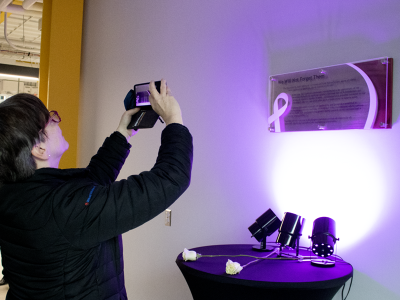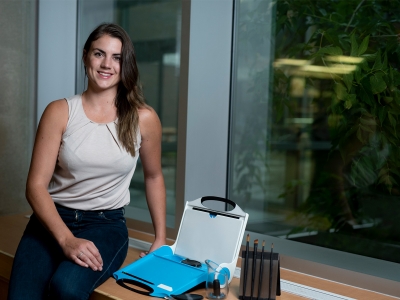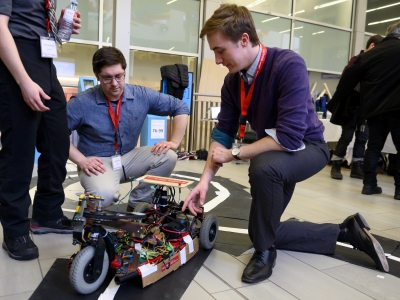By Tyrone Burke
Even if you are just lounging around the house, dieticians recommend drinking two litres of water each day, or even more. But if you are sweating out a hike in the hot sun, you will need to drink even larger quantities. And each litre of water weighs a kilogram, so there are limits on how much any person can carry – especially if you are traversing challenging terrain.
On any hike that lasts longer than a single day, you will want to pack a water filter that allows you to take water from a stream or lake. There are plenty of effective options on the market, but they can be expensive and use disposable plastic filters to do the job.
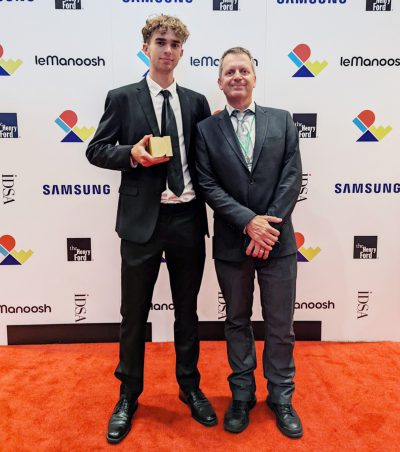
Luke Wightman (left), alongside School of Industrial Design Instructor Rob Watters, was presented with his award on Sept. 12 at the 2022 IDSA International Design Excellence Awards Winner Ceremony and Gala in Seattle, Washington.
Luke Wightman envisioned an alternative that is both cheaper and more sustainable. The fourth-year student in Carleton’s Bachelor of Industrial Design program earned a prestigious 2022 Gold Industrial Design Excellence Award (IDEA) from the Industrial Designers Society of America (IDSA) for his design of the Neto Water Filter bag.
Wightman’s design began as part of a third-year design studio project that asked students to make an incremental innovation on an existing product.
“While I was doing my research, I came across a study from researchers at MIT that used wooden discs to filter bacteria out of water in northern India. And I thought this type of water filtration product would be applicable for use by hikers too, but there is nothing like it on the market right now,” says Wightman, who developed his connection with the outdoor recreation on hiking trips in the Canadian Rockies and Italy’s Dolomite Mountains.
“The design solves a few different problems. It filters out 99 per cent of bacteria, which is comparable to plastic filters, which claim to filter up to 99.99%. But the Neto Water Filter Bag uses a natural resource that is biodegradable”
“The wooden disc filters do need to be replaced more often than plastic ones, but replacing these filters could be much cheaper.”
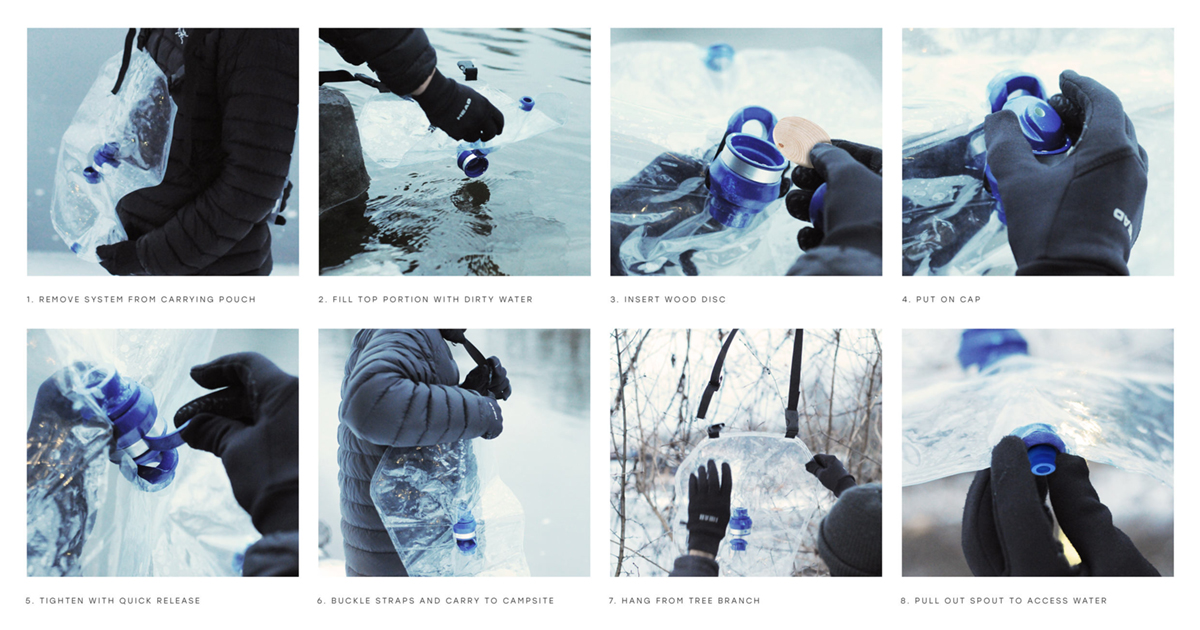
Wightman is one of only a few students that have won an IDEA award in the history of Carleton’s School of Industry Design, which is celebrating its 50th anniversary in 2022-23. The award was also one of just thirty IDEA Gold Awards given out in 2022, and he shared the distinction with designers from multinational companies like Microsoft, LG and 3M.
The Neto Water Filter bag is designed so that it can be worn as a vest, with straps to distribute weight more evenly, and to make it easier to carry from the water source back to camp. Though the project focused specifically on recreational use, Wightman hopes that the design could also help improve access to clean water in parts of the world with limited access to it.
“Luke’s design instinctually seemed like something that could resonate with jurors at the Industrial Design Society of America. He really tried to understand where there is a niche in the market,” says Rob Watters, an Instructor in the School of Industrial Design who teaches the Design Studio course.
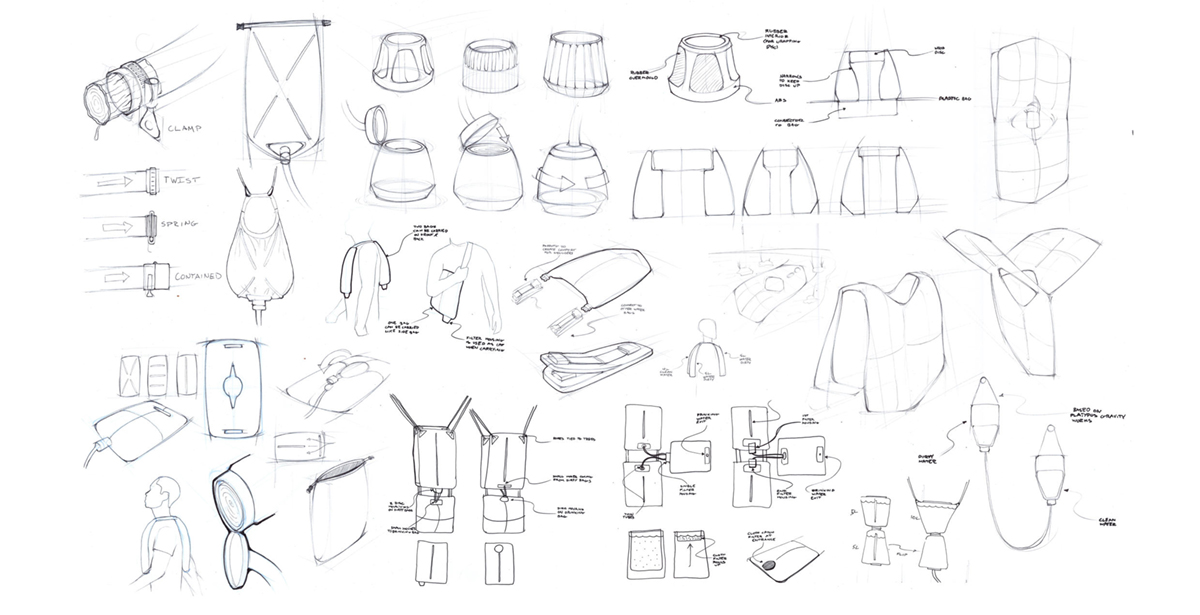
Initial concept designs for Wightman’s Neto Water Filter.
“The competition was judged by some of the top end people in the field. And they are always looking for what is new and innovative. This competition does not just look for a pretty image of a product. There needs to be an underlying advancement in what you are doing.”
“This product has a series of innovations. It incorporates the idea of sustainability and usability, and it works with the flow of activity of a person collecting water and going back to a camp. It really is a nice combination.”
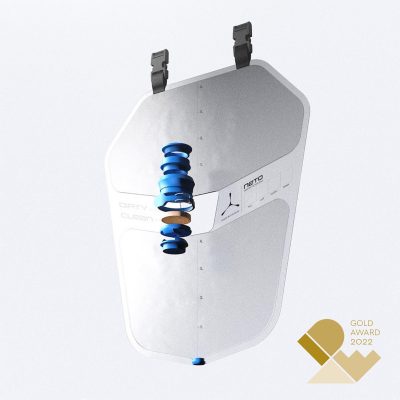
Watters asked his students to make an incremental advance to an existing product in one of several categories. Water purification was one of them, and Wightman’s interest in the outdoors drew him in. As a career path though, Wightman is most interested in athletic footwear design. In between his third and fourth years of study, he completed a design internship in Toronto with Power footwear, an athletic footwear brand owned by Bata Shoes.
“I am really into sports – soccer, basketball, hockey. Performance is where my passion really lies,” says Wightman.
“All of the skills I have learned through the three years of my Bachelor of Industrial Design degree are setting me up nicely to do this work. Just going through the design process for the projects that I have done at Carleton – ideation, sketching, physical prototyping, 3D modeling, rendering, design briefs and presentations. The hard skills are transferable, and so are the soft skills.”
Friday, September 30, 2022 in Competitions and Awards (External), Experiential Learning, Feature Stories, Industrial Design, Water
Share: Twitter, Facebook
